23 Promising Benefits Of Mustard Oil For Skin, Hair, And Health
Explore the therapeutic and healing properties that can make a big difference.
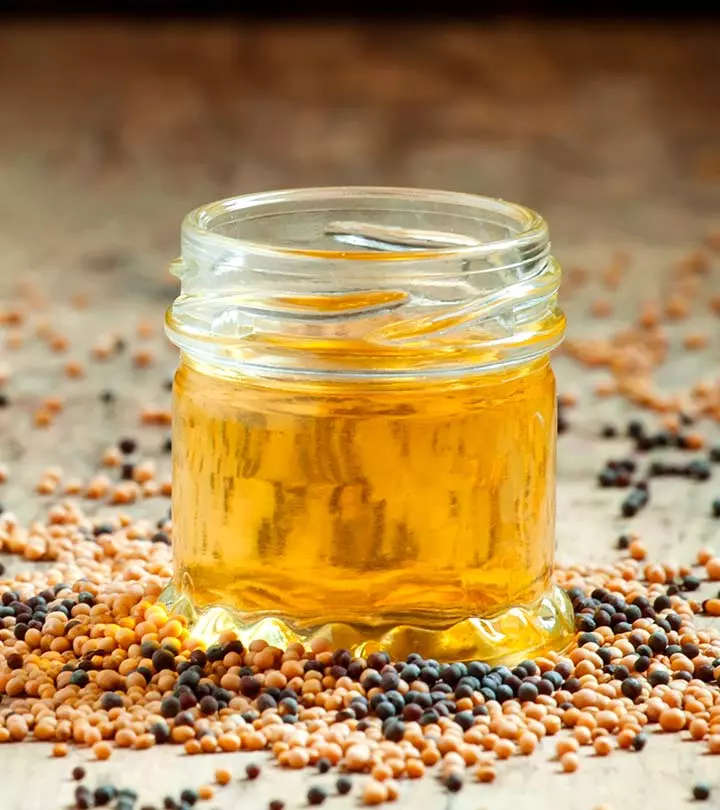
Image: iStock
Mustard oil benefits have been known to humanity for thousands of years. Originally grown in India as early as 3000 BC, it is most famous for its medicinal benefits.
Mustard oil is a rich source of monounsaturated fatty acidsi A type of simple healthy dietary fat commonly found in foods like nuts, olive oil, and avocados. and has anti-inflammatory properties. In addition, it contains omega 3 and omega 6 fatty acids, powerful antioxidants, and essential minerals beneficial to health. In many cultures, especially in India, mustard oil is used for both cooking and traditional medicine. It has been a part of rituals and health practices for thousands of years.
There are potential benefits to using this oil, including protecting against cardiovascular disease, relieving colds and coughs, and addressing hair and skin issues.
This article discusses the benefits of mustard oil, its nutritional profile, how to use it, and its side effects. Read on.
 Know Your Ingredient: Mustard Oil
Know Your Ingredient: Mustard OilWhat Is It?
A fragrant and pungent oil obtained from grinding mustard seed, mixing it with water, and distillation.
What Are Its Benefits?
Its omega 3 and omega 6 fatty acid content may keep the heart healthy, and its anti-inflammatory properties may help reduce joint pain.
Who Can Use It?
Anyone can consume it except for pregnant women as it contains compounds that may be harmful to them as well as the growing fetus.
How Often?
It can be consumed daily in moderation.
Caution
Excess use of more than 700 ml a month can cause risks of lung cancer and heart disease.
In This Article
What Are The Health Benefits Of Mustard Oil?
The health benefits of mustard oil are multiple. It is known to help treat ailments related to the heart, skin, joints, muscles, among having other benefits. Following are some of the well-known benefits of this wonder oil.
1. May Reduce Risk Of Cardiovascular Disease
Mustard oil contains high amounts of monounsaturated and polyunsaturated fatty acids (MUFA and PUFA) and omega 3 and omega 6 fatty acids.
These good fats lower your risk of developing ischemic heart diseasei Also known as coronary heart disease, it is a condition in which less blood and oxygen reach the heart. by 50% (1).
In rats, enriched mustard had also shown hypocholesterolemic (cholesterol-lowering) and hypolipidemic (lipid-lowering) effects (2). The oil could reduce bad cholesterol (LDL) levels and increase good cholesterol (HDL) levels in the body. This could reduce the risk of cardiovascular diseases.
2. May Have Antibacterial, Antifungal, And Anti-inflammatory Properties
Mustard oil is known to contain antibacterial, antifungal, and anti-inflammatory properties.
Its anti-inflammatory properties are attributed to the presence of selenium. The mineral is known to reduce pain and swelling, thus easing joint pain. This anti-inflammatory property of mustard oil also finds its use in the formulation of diclofenac, an anti-inflammatory medication (3).
Recent studies have shown that micro-emulsionsi A drug carrier system for oral consumption, topical application, and parenteral administration. containing mustard oil work as antibacterial agents against E. coli (4). The glucosinolate in mustard oil prevents the growth of unwanted bacteria and other microbes.
Mustard oil also contains powerful antifungal properties that may treat skin rashes and infections caused by fungi. A study was conducted on rye bread spoilage (by fungi) by exposing it to different oils. Mustard oil proved to be the most effective, owing to the presence of a compound called allyl isothiocyanate (5).
3. May Relieve Cold And Cough

Owing to its pungent nature, mustard oil has been used to relieve cold and cough since decades.
It contains a heating property that may clear up the congestion in the respiratory tract. It works best when combined with garlic and massaged on the chest and the back (6).
Another method of using mustard oil for clearing cold and cough, as per anecdotal evidence, is using steam treatment. Add caraway seeds and a few spoons of mustard oil to a pot of boiling water and inhale the steam. This can clear the phlegm build-up in the respiratory tract.
4. May Act As A Natural Stimulant
There is limited research in this regard. Mustard oil is believed to be a very powerful natural stimulant. It improves digestion and appetite by stimulating digestive juices and bile in the liver and spleen, respectively. When massaged into the skin, it also stimulates our circulatory system and sweat glands. This ensures improved blood circulation throughout the body and enlarged skin pores through sweating.
This diaphoretic (sweat-inducing) ability of mustard oil may result in lowered body temperature and the removal of toxins from the body.
However, more research is warranted to further understand this benefit.
5. May Reduce The Risk Of Cancer
Mustard oil may have cancer-fighting properties. It contains ample amounts of linolenic acid, which can enhance the immunity of the body. Some research suggests that this acid may reduce the severity of colon cancer (7).
A study by South Dakota University had proven the same. They tested the efficacy of mustard, corn, and fish oils on rats affected by colon cancer. Mustard oil was found to be more effective in preventing colon cancer in rats than fish oil (8).
6. May Ease Joint Pains And Arthritis

Regularly massaging mustard oil on the skin may help treat joint aches and arthritis by potentially increasing blood flow and circulation throughout the body.
Melissa Mitri, MS, RD, says, “Mustard oil is naturally warm in temperature and is often used topically during massage to warm the body.”
Mustard oil also contains large amounts of omega 3 fatty acids. These have anti-inflammatory properties that may help ease joint stiffness and provide pain relief associated with arthritis (9).
7. May Improve The Functioning Of The Organs
A body massage with mustard oil may refresh the body and improve the functioning of the organs. It may achieve this by increasing blood circulation to all parts of the body. However, more concrete research is needed in this aspect.
Mustard oil massage for newborns is quite a popular practice in many countries. The common reasons for using mustard oil for massaging include better body strength and improved overall health (10).
8. May Help Treat Asthma

Asthma is a disease that may have no permanent cure. But its symptoms and effects may be managed and reduced by using mustard oil. This is known to be one of the safest and most effective remedies to treat the effects of asthma. However, there is no concrete data on the use of mustard oil to relieve asthma symptoms. Most of the information available in this regard is anecdotal.
You may still use mustard oil for its purported benefits. Massage brown mustard oil on your chest. This may increase airflow to the lungs during an asthma attack. You may also make a mixture of one tablespoon of mustard oil with one teaspoon of camphor and rub it on your chest.
You may also reduce the frequency of asthma attacks by swallowing a mixture of one tablespoon each of mustard oil and honey, three times a day.
9. May Act As An Insect Repellent
This property of mustard oil was evaluated in a study conducted in Assam, India. The insect repellent properties of mustard and coconut oils were evaluated against Aedes (S.) albopictus mosquitoes. Mustard oil was very effective in providing protection for a longer time as compared to coconut oil (11).
10. May Whiten Teeth And Treat Dental Problems

Some research suggests that mustard oil may help treat dental issues. Make a paste of half a teaspoon of mustard oil, one teaspoon of turmeric powder, and half a teaspoon of salt. Rub this mixture on your teeth and gums twice a day. This can promote healthy teeth and may provide relief from gingivitisi A common gum disease that causes inflammation, redness, and irritation of the gums surrounding the base of teeth. and periodontitisi A severe mouth infection that damages the gum and jawbone, leading to tooth loss and other health complications. (12).
More research is needed to further understand this benefit of mustard oil.
11. May Aid Weight Loss

Mustard oil contains certain B-complex vitamins such as niacin and riboflavin. These may help increase body metabolism and help in losing weight. The oil also contains diacylglycerol that may contribute to weight loss (13).
12. May Boost Brain Function
The high concentration of fatty acids in mustard oil may boost brain function, though there is no concrete research in this area.
Some believe the oil may also boost memory and improve cognitive functions.
13. May Stimulate Sensation In The Muscles
If you are experiencing numbness in your muscles, mustard oil may help. Massage some of the oil on the affected area and you may slowly experience some sensation in your muscles. However, this information is purely based on anecdotal evidence. Concrete research is lacking in this area.
14. May Help Heal Chapped Lips
There is limited research available. It is believed that applying the oil to chapped lips may heal them.
Some also believe that adding a few drops of the oil to the belly button before sleeping may help heal chapped lips. There is no evidence to prove this.
15. May Promote Overall Health
Mustard oil may be used as a healthy tonic to promote one’s overall health and wellness. It may offer benefits to the entire body when used externally. Oral intake of the oil in high amounts is not recommended.
 Trivia
TriviaIn the following section, we will explore the potential benefits of mustard oil on one’s skin.
Does It Have Benefits For The Skin As Well?
The regular use of mustard oil may give you glowing and healthy skin. However, the information in this regard is limited.
16. May Reduce Tan And Dark Spots
Massaging mustard oil on your face regularly may significantly reduce tan, dark spots, and skin pigmentation.
Make a paste of mustard oil with chickpea flour, one teaspoon of yogurt, and a few drops of lemon juice. Apply this to your face and neck. Leave it on for 10 to 15 minutes before washing it off with cold water. Do this three times a week for a few months. You may notice some difference.
However, there is no research available to substantiate this claim.
17. May Improve The Skin Tone
Mustard oil is rich in B-complex vitamins. These vitamins may promote skin health (14).
You may mix equal parts mustard and coconut oils. Massage this mixture into your skin every night for 15 minutes and then wash off with a mild face wash.
If you use it regularly, you may start to notice an improvement in your skin tone. It may also reduce the signs of aging by delaying the onset of wrinkles.
18. May Act As A Natural Sunscreen
Massage a small quantity of mustard oil into your skin before you step outdoors. The oil is rich in vitamin E. The nutrient may protect your skin from the harmful UV rays and environmental toxins (15).
Ensure you do not use too much of the oil on your face, as it may attract dust and pollution.
19. May Treat Rashes And Infections
Mustard oil has powerful anti-inflammatory, antibacterial, and antifungal properties. The oil may help heal skin rashes, allergies, and infections. It may also prevent skin dryness and itching. However, there is no sufficient data to prove these claims.
20. May Have Anti-Aging Effects
Mustard oil contains vitamin E. This vitamin may help reduce wrinkles and other signs of premature aging (15).
In the following section, we will explore the potential benefits of mustard oil for hair health.
Is Mustard Oil Good For Hair?
The traditional use of mustard oil, apart from cooking, is in hair and skin care. Mustard oil may promote hair growth, prevent hair loss, and reduce premature graying. A mixture of mustard oil and curd may also help treat certain hair issues. Take a look at how mustard oil benefits your hair.
21. May Stimulate Hair Growth
Regular hair massages keep the scalp nourished. Mustard oil may stimulate hair growth by increasing blood circulation in the scalp. It contains protein, a major component of hair, and omega 3 fatty acids. These two nutrients may nourish your hair.
The antibacterial and antifungal properties of this oil may prevent scalp infections and hair loss.
Massage a little oil into your hair and scalp. Cover your hair with a shower cap for about three hours and shampoo and condition your hair as usual. After a few uses, you may see visible results.
This information is based on anecdotal evidence. Concrete research in this aspect is lacking.
A YouTuber tried mustard oil for her hair and shared her experience in her vlog. She says, “I have to say it has improved my hair so much it’s literally crazy. I feel like it’s just taken away the dryness. I feel like I have a whole new head of hair. It is really moisturizing in a way that I haven’t experienced (i).”
22. May Prevent Premature Hair Graying
Mustard oil is packed with essential vitamins and minerals that may help prevent premature hair graying. You may use the oil before going to bed or in the morning. Apply mustard oil to your hair and leave it on for 30 minutes before washing it off.
However, more research is required to further understand this benefit of mustard oil.
23. May Help Relieve Dandruff And An Itchy Scalp
There is no research stating that mustard oil can totally treat dandruff. Anecdotal evidence suggests that it may help relieve dandruff and scalp itchiness due to its antibacterial and antifungal properties.
You may still try using the oil. You may mix equal amounts of mustard and coconut oils and massage into your scalp. Cover your hair with a towel and leave it on for two hours. Wash off with a mild shampoo. Do this a few times a week.
 Quick Tip
Quick TipThese are the potential benefits of mustard oil for hair. We will try to understand more of the oil in the following sections.
More About Mustard Oil
Mustard oil has culinary as well as therapeutic uses. Here are some quick facts about mustard oil:
Scientific Name: Brassica juncea
Common Names: Sarson ka tel (Hindi), Sarsay tel (Bengali), Kadugu Ennai (Tamil), Avanune (Telugu), Rainu tel (Gujarati), Mohariche tel (Marathi), Kadugenna (Malayalam), and Sorisha tela (Oriya)
Color: Dark (reddish) yellow
Aroma: Strong
Taste: Pungent and sharp flavor
Smoke Point: 480oF/250oC
Extraction Process: Extracted from mustard seeds and purified through distillation
How Mustard Oil Is Made – There are two ways of making mustard oil: by pressing and grinding. The first method is to press the mustard seeds to get the vegetable oil. The second method is to grind the seeds, mixing them with water, and then extracting the oil by distillation. This results in mustard oil that is lower in fat content.
Here’s a glimpse into the history of mustard oil.
The History Of Mustard Oil
- Mustard oil has been popularly used in countries like India, Rome, and Greece for thousands of years.
- Its first known uses were medicinal – Hippocrates used mustard seeds to prepare certain medicines.
- The Romans reaped the benefits of mustard seeds by adding them to their wine. Pythagoras, the Greek scientist, used it as a natural treatment for scorpion stings.
Let’s now look into the nutritional profile of mustard oil.
What Are The Nutrients* In Mustard Oil?
Mustard oil has an edge over other oils due to its optimum ratio of omega 3 and omega 6 fatty acids. It also has a low content of saturated fats. Its nutritional profile is given below.
| AMOUNT PER 1 TSP (4 G) 1 TBSP (14 G) 100 GRAMS 1 CUP (218 G) 100 GRAMS | ||||||||
|---|---|---|---|---|---|---|---|---|
| Calories 884 | ||||||||
| % Daily Value* | ||||||||
| Total fat 100 g | 153% | |||||||
| Saturated fat 12 g | 60% | |||||||
| Polyunsaturated fat 21 g | ||||||||
| Monounsaturated fat 59 g | ||||||||
| Sodium 0 mg | 0% | |||||||
| Total Carbohydrate 0 g | 0% | |||||||
| Dietary fiber 0 g | 0% | |||||||
| Protein 0 g | 0% | |||||||
| Vitamin A | 0% | |||||||
| Calcium | 0% | |||||||
| Vitamin B-6 | 0% | |||||||
| Magnesium | 0% | |||||||
| Vitamin C | 0% | |||||||
| Iron | 0% | |||||||
| Vitamin B-12 | 0% | |||||||
*values sourced from Food data central, in association with USDA, oil, mustard
- Key Nutrients: It contains about 60% monounsaturated fats (MUFA), 21% polyunsaturated fats (PUFA), and 12% saturated fats. These fatty acids are considered ‘good fats’ as they do not get deposited on the arterial walls. The oil’s pungent and sharp flavor can be attributed to a compound called allyl isothiocyanate. It also contains glucosinolates that have antimicrobial properties. Mustard oil does not contain carbohydrates, fiber, protein, vitamins, and minerals. Being a vegetable source, mustard oil contains alpha-linolenic acid or ALA, an essential omega 3 fatty acid. One teaspoon of mustard oil contains around 0.8 grams of omega 3 fatty acid.
- Calories And Fat: One tablespoon of mustard oil contains about 124 calories. It contains about 14 grams of fat, of which 8.3 grams are monounsaturated fats, 2.9 grams are polyunsaturated fats, and 1.6 grams are unsaturated fats. The oil has a lower content of monounsaturated fats as compared to that of olive, flaxseed, grape seed, and peanut oils.
Clearly, mustard oil has a nourishing nutritional value. However, it faces stiff competition from its popular rival – sunflower oil. Wondering if the benefits of sunflower oil outweigh those of mustard oil? Find out in the next section.
Which Oil Is Better: Mustard Or Sunflower?
Mitri says, “Both oils have their own health benefits and potential risks. Mustard oil is higher in monounsaturated fats, but a certain type of fat called erucic acid may pose health risks in large quantities. Sunflower oil is higher in polyunsaturated fats and omega-6 fats, essential fats that we need but which can be harmful if we consume them in excess.”
She continues, “Both are pretty equivalent in terms of nutrition, and it comes down to your preference. It is recommended to consume both in moderation in order to support optimal health and reduce any potential risks of overconsumption.”
Are you wondering how you can use this oil in your cooking? Here are some recipes to help you out.
What Are Some Recipes With Mustard Oil?
1. Mango Pickle
You Will Need
- 500 grams raw mango pieces
- 100 grams mustard oil
- 1 teaspoon asafoetida
- 50 grams mustard seeds
- ½ teaspoon dry ginger powder
- ½ teaspoon turmeric powder
- 100 grams garlic cloves
- 50 grams red chili powder
- Salt, as per taste
Method
- Marinate the mango pieces in the salt and turmeric. Leave them overnight.
- Remove the water from them and dry them in the sun.
- Fry the garlic cloves.
- Heat the mustard oil till it smokes and leave it aside to cool.
- When the mango pieces are completely dried, mix them with garlic cloves, mustard oil, and the spices and store the pickle in a jar.
2. Tandoori Paneer Tikka
You Will Need
- 250 grams paneer (cottage cheese)
- 1 bell pepper (green, red or yellow – or a mixture of all three)
- 1 medium onion
For The Marination
- 200 grams thick yogurt
- 1 tablespoon ginger-garlic paste
- 1 teaspoon carom seeds
- 1-2 teaspoons red chili powder
- ½ teaspoon turmeric powder
- 1 teaspoon cumin seed powder
- 1 teaspoon coriander seed powder
- ½ teaspoon garam masala powder
- 1 teaspoon dry mango powder
- 1 teaspoon chaat masala
- ½ teaspoon black pepper powder (optional)
- ½ tablespoon lemon juice
- 1 tablespoon mustard oil
- ½ teaspoon black salt (optional)
- Regular salt, as required
Method
To Prepare The Tikka
Chop the paneer and the vegetables in square pieces and keep them aside.
To Prepare The Marination
- In a bowl, whisk the curd till there are no lumps.
- Add the ginger-garlic paste, all the spices, carom seeds, and salt to the curd and mix well.
- Add the vegetables and paneer to the marinade and coat them well.
- Leave this marination for two or more hours in the refrigerator.
- Remove from the refrigerator and allow the vegetables to come to a room temperature.
- Arrange the paneer and vegetable cubes on skewers.
Making The Tikka
- Preheat the oven for 15 minutes at 240o
- On a rack, arrange the skewers and brush the mustard oil on the marinated paneer and vegetables.
- Bake the tikkas for 15 to 20 minutes or till they turn golden brown and then turn the skewers.
- Bake again for another 10 to 15 minutes or till they are baked completely.
- Arrange the tikkas on a plate, squeeze some lemon juice, and sprinkle some chaat masala on them.
- Serve hot.
If you are planning to buy this oil and wondering how to select the best, here’s what you need to know.
How To Select And Store Mustard Oil
Selection
There are plenty of mustard oil varieties available on the market. Selecting the best one could be challenging. Let us make that task easier for you by briefing you about the three main types of mustard oil:
- Kachi Ghani
This is the most popularly used form of mustard oil and is extracted through the cold pressed method. This type of oil is natural in flavor and has a lot of antioxidants and nutrients retained.
- Agmark
All agricultural products that are grown or produced organically are supposed to be certified with Agmark. Hence, if you pick a mustard oil that has the Agmark label on it, you can be sure of its quality and organic integrity.
- Grade 1
Grade 1 mustard oil is a mixture of oils that are obtained by grinding yellow and brown mustard seeds. The best way to do a quality check for this oil is to test its nutty flavor. A nutty taste denotes good quality.
Storage
Mustard oil should only be bought in a quantity that can be used up within six months from opening its seal. Store the oil in an airtight bottle, preferably in a refrigerator. This will prevent the oil from turning rancid.
Any Other Uses Of Mustard Oil?
There are plenty of uses of this oil, especially in cooking and beauty. Some of them are mentioned below.
Cooking Uses
- Mustard oil is used in many Indian states as the main component in vegetarian and non-vegetarian dishes.
- It can be used as a salad dressing along with lemon and honey.
- Several pickles are made using mustard oil.
Other Uses
- Apply the oil on the skin for 10 minutes to remove tan, reduce the signs of aging, and treat itchiness and redness of skin.
- A full body massage with mustard oil helps deeply nourish the skin as well as relax the body.
- Mustard oil boiled with henna leaves is said to increase hair growth and strengthen the hair follicles.
- Men may use mustard oil to grow their beard faster. All they need to do is fill a blue glass bottle with mustard oil and place it in the sun, preferably during the early mornings, for 40 days. They may then start using the oil on their beard and mustache to regrow or increase the hair.
Mustard oil does have certain benefits, though more research is ongoing. The use of mustard oil may also cause certain side effects. Concrete research on these effects is lacking. We have briefly discussed the side effects in the following section.
What Are The Side Effects Of Mustard Oil?
Mustard oil use may cause side effects when taken in quantities more than the normal food amounts.
- It may cause anemia in susceptible individuals if taken in excess. The science behind this phenomenon is yet to be studied.
- Consuming mustard oil in large quantities may increase the risk of lung cancer in some individuals. The mechanism is yet to be studied.
- The oil may cause vaginal bleeding and eventually cause miscarriage.
- Consuming large quantities of the oil may increase the risk of heart ailments.
Therefore, it is important to use mustard oil in moderation and check with a doctor before adding it to your diet, especially if you have health conditions or are pregnant. This helps ensure safe use and maximizes its health benefits.
Infographic: 6 Ways Mustard Oil Can Improve Your Skin, Hair, And Health
Mustard oil is a popular ingredient found in nearly every kitchen. But since competing oils with health claims or heart-friendly labels have entered the market, mustard oil has lost some of its prior significance. However, the oil has a lot to offer in terms of skincare, beauty, and health. Check out the infographic below to learn about some of the ways mustard oil can help improve your overall health. Illustration: StyleCraze Design Team

Mustard oil benefits go beyond being a popular cooking oil. This healthy oil has a rich nutritional profile that offers a range of skin, hair, and health benefits. It is a good source of minerals, monosaturated fatty acids, and potent antioxidants. Mustard oil may promote heart and brain health. It may provide relief from arthritis pain too. This natural antibacterial and anti-inflammatory agent moisturizes and rejuvenates your skin, delaying the early signs of aging. Further, it may promote hair growth and tackle dandruff. Nevertheless, excessive use may have side effects. If you experience any adverse effects, limit its use and seek medical advice.
Frequently Asked Questions
What is Kacchi Ghani mustard oil?
This is the form of mustard oil that is cold pressed. It is also called raw grade mustard oil.
Can we apply mustard oil to wet hair?
Yes. Mustard oil can be applied to wet hair. It won’t damage your hair unless you comb it with a sharp brush. Ensure you don’t leave this oil on hair for more than six to eight hours. It may block the hair follicles.
Does applying mustard oil regularly darken the skin?
No, mustard oil does not darken the skin. On the contrary, it may improve your skin tone.
How long should I keep mustard oil on my hair?
You may leave mustard oil in your hair for two to three hours.
Is refined oil better than plain mustard oil?
No. Plain mustard oil is natural and healthier than refined oil.
What are the ways to remove the fat from mustard oil?
You can grind mustard seeds, mix them with water, and extract the mixture by distillation to obtain the oil from them. This method gives you oil that contains less fat.
How would you know if you are allergic to mustard oil?
Common allergy symptoms of mustard oil are rashes, itchiness, asthma, coughing, nausea and vomiting, and difficulty in breathing. See a physician immediately if you experience any of these symptoms.
Is mustard oil toxic?
Mustard oil contains about 40% erucic acid, which, when consumed in large quantities, may be toxic. It is for this reason the sale of this oil is banned in the US. More research is warranted in this regard, however.
What is mustard oil called in other languages?
Mustard oil is called Sarson ka tel in Hindi, Zayt alkhardl in Arabic, Tōrīkō tēla in Nepali, and Sariṣā tēla in Bengali.
Does mustard oil increase triglycerides?
The two essential fatty acids in mustard oil, such as omega 3 and omega 6 fatty acids, balance cholesterol levels. These may also reduce triglyceride levels and keep the heart healthy. More information is needed in this regard, however.
Is mustard oil good for treating knee pain?
Yes, mustard oil may help treat knee pain. The anti-inflammatory properties of mustard oil may help treat knee pain.
Key Takeaways
- Mustard oil helps boost brain function and weight loss and treats asthma
- Mustard oil helps reduce signs of aging, moisturizes the skin, and improves skin appearance.
- You can add mustard oil to your salads, pickles, and savory dishes.
- Excess use and consumption of mustard oil increase the risk of lung cancer and heart disease.
Illustration: Promising Benefits Of Mustard Oil For Skin Hair And Health
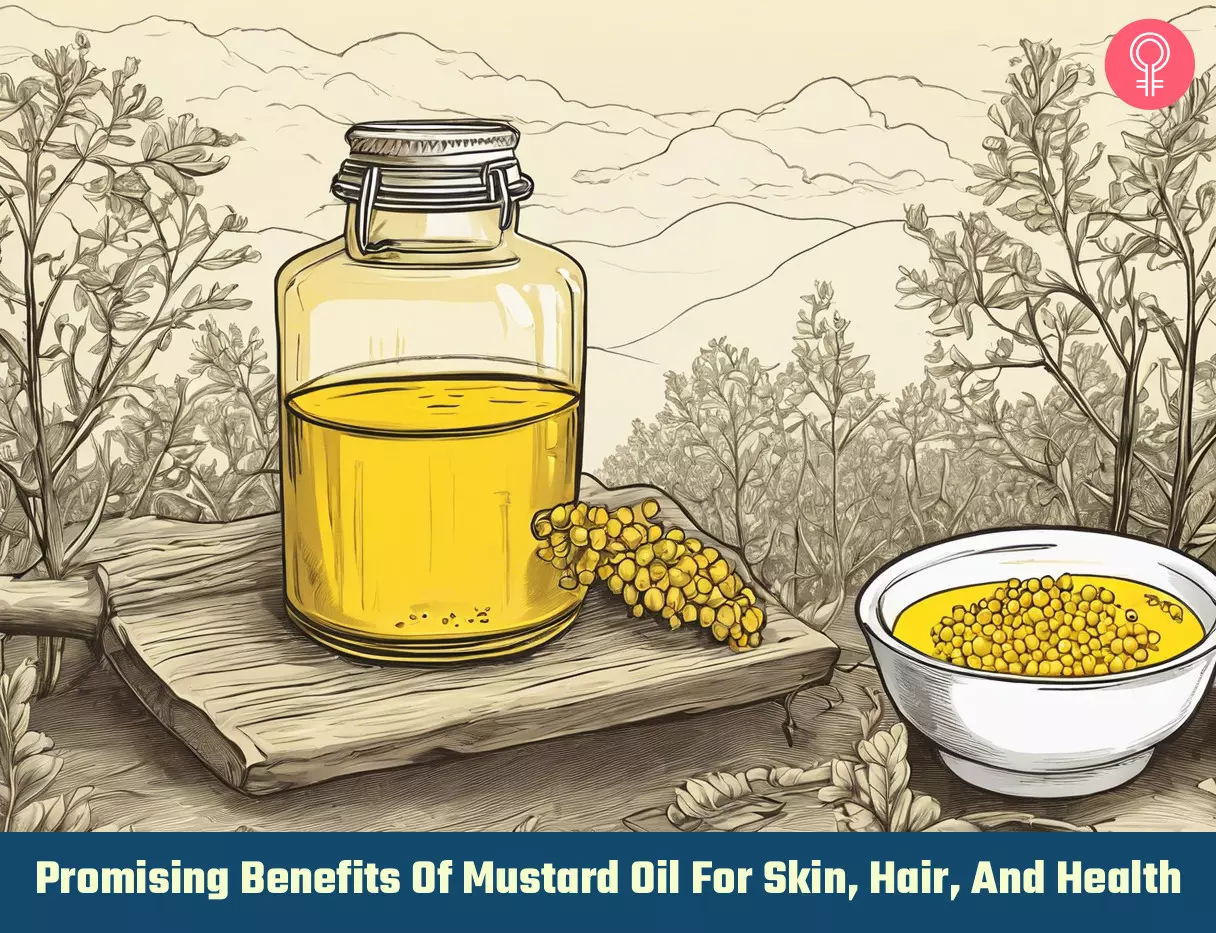
Image: Stable Diffusion/StyleCraze Design Team
Mustard oil has been used for centuries, but is it safe? Find out the truth about mustard oil and get your facts right by clicking on this video.
Personal Experience: Source
StyleCraze's articles are interwoven with authentic personal narratives that provide depth and resonance to our content. Below are the sources of the personal accounts referenced in this article.
i. Mustard Oil for Rapid Hair Growth | Benefits of Mustard Oil for 4C Hairhttps://www.youtube.com/watch?v=vN510UEXwlY
References
Articles on StyleCraze are backed by verified information from peer-reviewed and academic research papers, reputed organizations, research institutions, and medical associations to ensure accuracy and relevance. Read our editorial policy to learn more.
- Trichopoulou, Antonia, et al. “Definitions and potential health benefits of the Mediterranean diet: views from experts around the world.” BMC medicine12.1 (2014): 112.
https://www.ncbi.nlm.nih.gov/pmc/articles/PMC4222885/ - Sengupta, Avery, and Mahua Ghosh. “Hypolipidemic effect of mustard oil enriched with medium chain fatty acid and polyunsaturated fatty acid.” Nutrition27.11-12 (2011): 1183-1193.
https://pubmed.ncbi.nlm.nih.gov/21621386/ - Sagiri, Sai S., et al. “Thermal, mechanical and electrochemical characterization of gelatin-based physical emulgels.” Int. J. Electrochem. Sci10 (2015): 1233-1248.
https://www.researchgate.net/publication/279316363_Thermal_Mechanical_and_Electrochemical_Characterization_of_Gelatin-Based_Physical_Emulgels - Ghosh, Vijayalakshmi, Amitava Mukherjee, and N. Chandrasekaran. “Mustard oil microemulsion formulation and evaluation of bactericidal activity.” Inter J Pharm Pharma Sci4.4 (2012): 497-500.
https://www.researchgate.net/publication/235717159_MUSTARD_OIL_MICROEMULSION_FORMULATION_AND_EVALUATION_OF_BACTERICIDAL_ACTIVITY - Suhr, Karin Isabel, and Per Væggemose Nielsen. “Antifungal activity of essential oils evaluated by two different application techniques against rye bread spoilage fungi.” Journal of Applied Microbiology94.4 (2003): 665-674.
https://pubmed.ncbi.nlm.nih.gov/12631202/ - Mullany, Luke C., et al. “Traditional massage of newborns in Nepal: implications for trials of improved practice.” Journal of tropical pediatrics51.2 (2005): 82-86.
https://www.ncbi.nlm.nih.gov/pmc/articles/PMC1317296/ - Chamberland, John P., and Hyun-Seuk Moon. “Down-regulation of malignant potential by alpha linolenic acid in human and mouse colon cancer cells.” Familial Cancer1 (2015): 25-30.
https://pubmed.ncbi.nlm.nih.gov/25336096/ - Dwivedi, Chandradhar, et al. “Chemopreventive effects of dietary mustard oil on colon tumor development.” Cancer letters196.1 (2003): 29-34.
https://pubmed.ncbi.nlm.nih.gov/12860286/ - Sharma, Kunal, et al. “Therapeutic evaluation of “Ayush Tulsi Jiwan Plus” oil for chronic musculoskeletal pain relief.” Ayu36.4 (2015): 387.
https://www.ncbi.nlm.nih.gov/pmc/articles/PMC5041386/ - Mullany, Luke C., et al. “Traditional massage of newborns in Nepal: implications for trials of improved practice.” Journal of tropical pediatrics51.2 (2005): 82-86.
https://www.ncbi.nlm.nih.gov/pmc/articles/PMC1317296/ - Das, N. G., et al. “Evaluation of botanicals as repellents against mosquitoes.” Journal of vector borne diseases40.1/2 (2003): 49.
https://pubmed.ncbi.nlm.nih.gov/15119071/ - Nagpal, Monika, and Shaveta Sood. “Role of curcumin in systemic and oral health: An overview.” Journal of natural science, biology, and medicine4.1 (2013): 3.
https://www.ncbi.nlm.nih.gov/pmc/articles/PMC3633300/ - Dhara, Rupali, Pubali Dhar, and Mahua Ghosh. “Dietary effects of diacylglycerol rich mustard oil on lipid profile of normocholesterolemic and hypercholesterolemic rats.” Journal of food science and technology50.4 (2013): 678-686.
https://www.ncbi.nlm.nih.gov/pmc/articles/PMC3671051/ - Rembe, Julian-Dario, Carolin Fromm-Dornieden, and Ewa Klara Stuermer. “Effects of vitamin B complex and vitamin C on human skin cells: is the perceived effect measurable?.” Advances in skin & wound care31.5 (2018): 225-233.
https://pubmed.ncbi.nlm.nih.gov/29672394/ - Schagen, Silke K., et al. “Discovering the link between nutrition and skin aging.” Dermato-endocrinology4.3 (2012): 298-307.
https://www.ncbi.nlm.nih.gov/pmc/articles/PMC3583891/
Read full bio of Alexandra Dusenberry
- Melissa Mitri is a Registered Dietitian-Nutritionist, Nutrition Content Writer and Weight Loss Expert with over 16 years of experience in the field of nutrition and wellness. Ever since she became a Dietitian, she has always been particularly drawn to helping people lose weight (in a healthy way). There are so many ways to go about it, and there is not a single method that works for everyone. She works with weight loss brands every day to help them create content that speaks to their ideal client, motivates them, and builds trust. These are all necessary things that need to happen because a customer makes a single purchase.
 Melissa Mitri is a Registered Dietitian-Nutritionist, Nutrition Content Writer and Weight Loss Expert with over 16 years of experience in the field of nutrition and wellness. Ever since she became a Dietitian, she has always been particularly drawn to helping people lose weight (in a healthy way). There are so many ways to go about it, and there is not a single method that works for everyone. She works with weight loss brands every day to help them create content that speaks to their ideal client, motivates them, and builds trust. These are all necessary things that need to happen because a customer makes a single purchase.
Melissa Mitri is a Registered Dietitian-Nutritionist, Nutrition Content Writer and Weight Loss Expert with over 16 years of experience in the field of nutrition and wellness. Ever since she became a Dietitian, she has always been particularly drawn to helping people lose weight (in a healthy way). There are so many ways to go about it, and there is not a single method that works for everyone. She works with weight loss brands every day to help them create content that speaks to their ideal client, motivates them, and builds trust. These are all necessary things that need to happen because a customer makes a single purchase.
Read full bio of Sindhu Koganti
Read full bio of Ravi Teja Tadimalla
Read full bio of Himanshi Mahajan





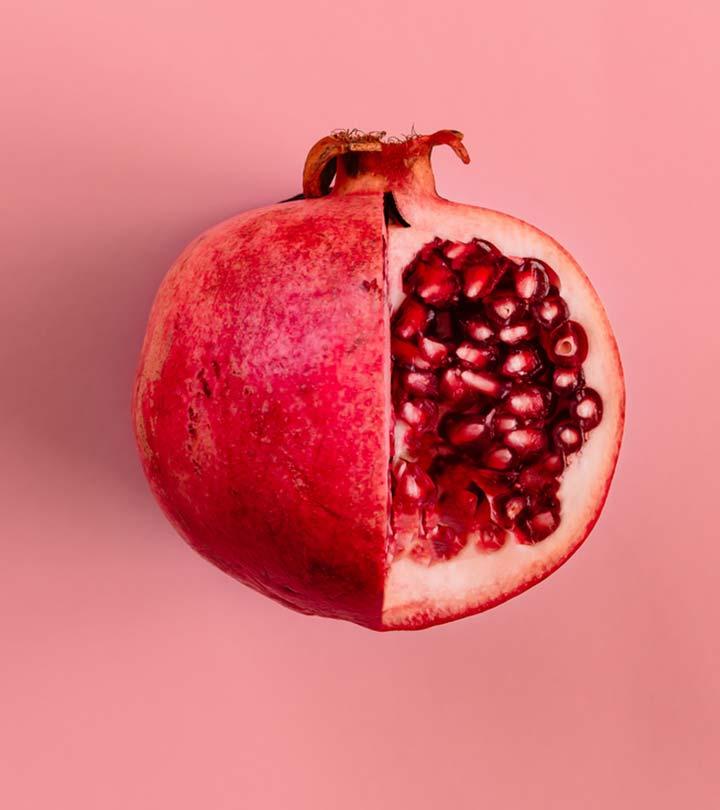
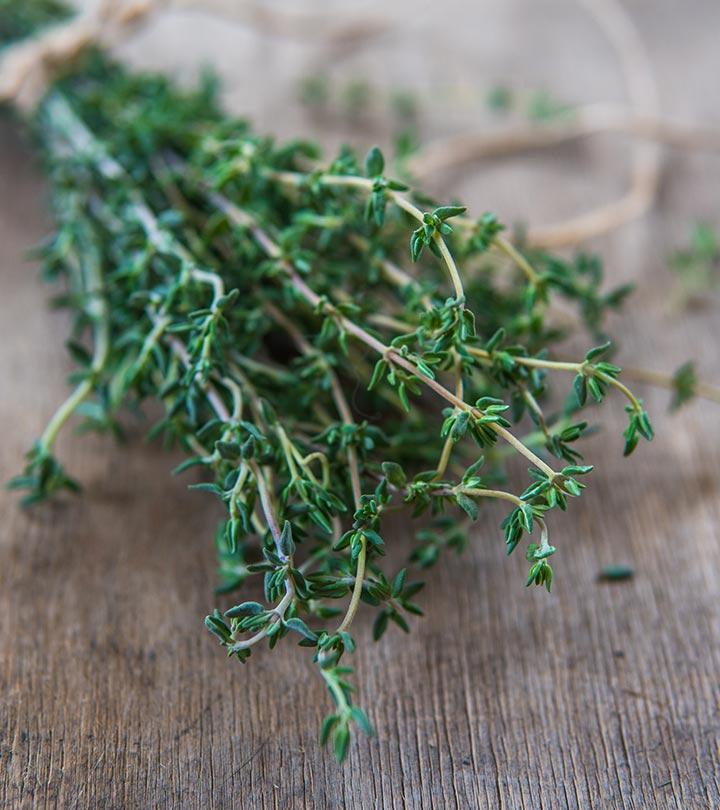
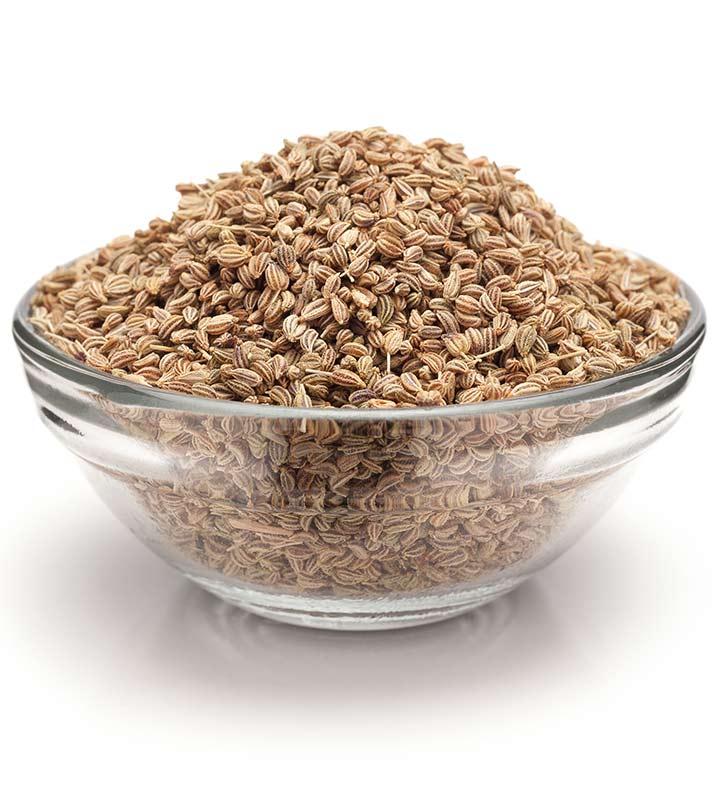
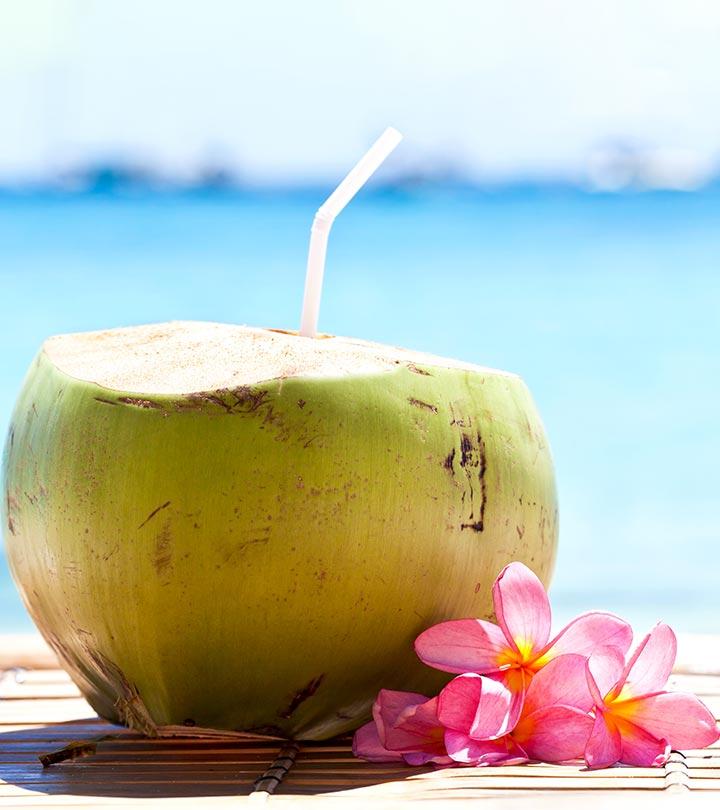

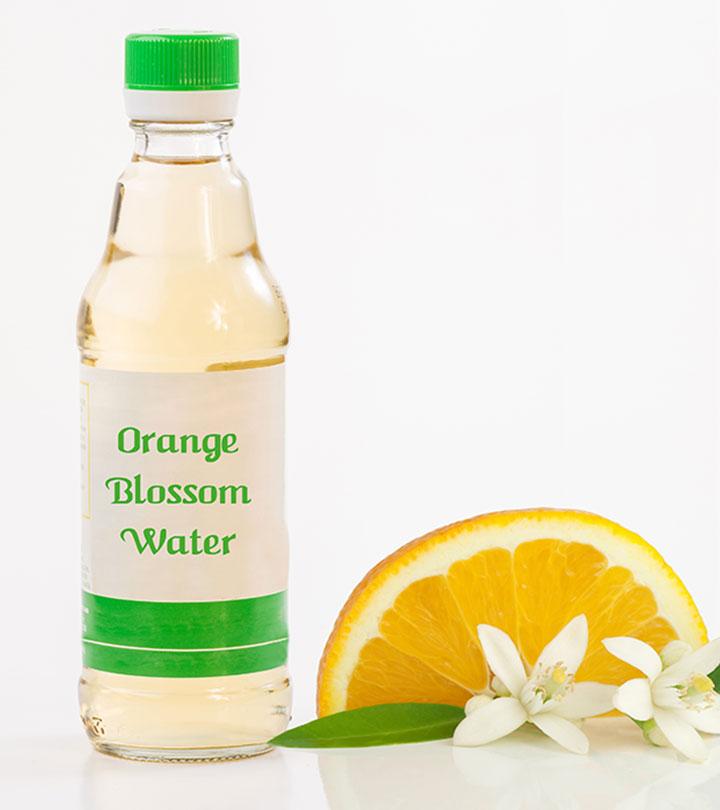
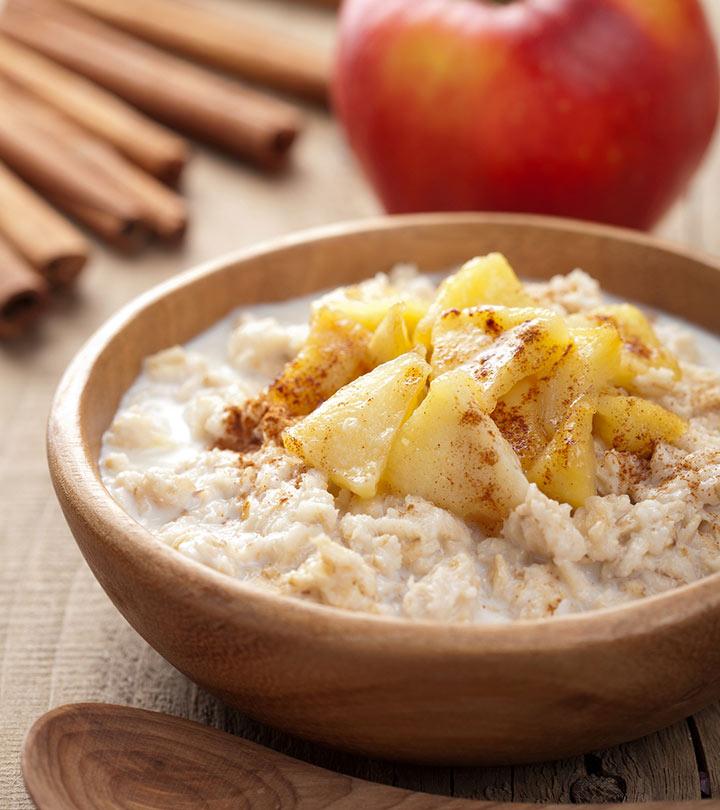
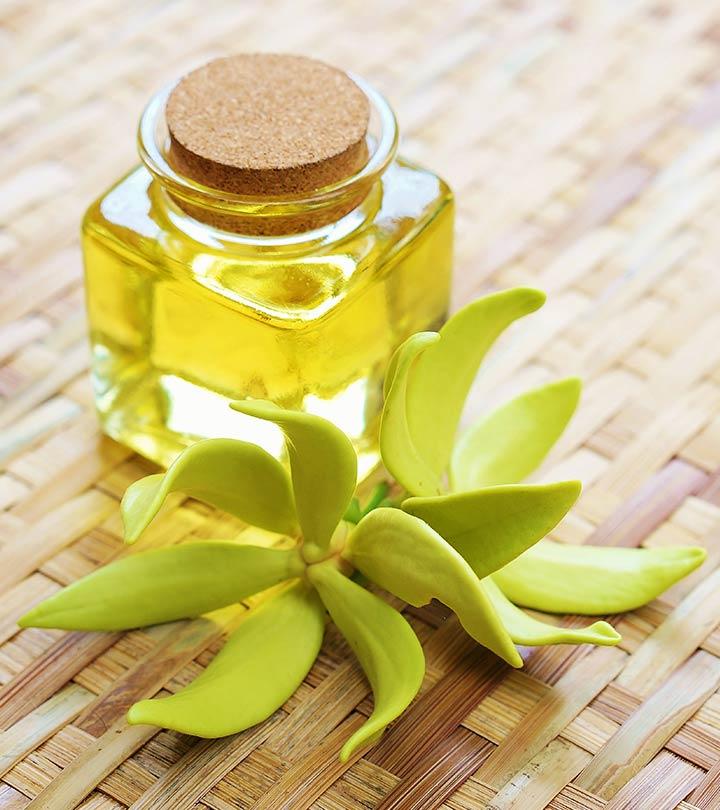
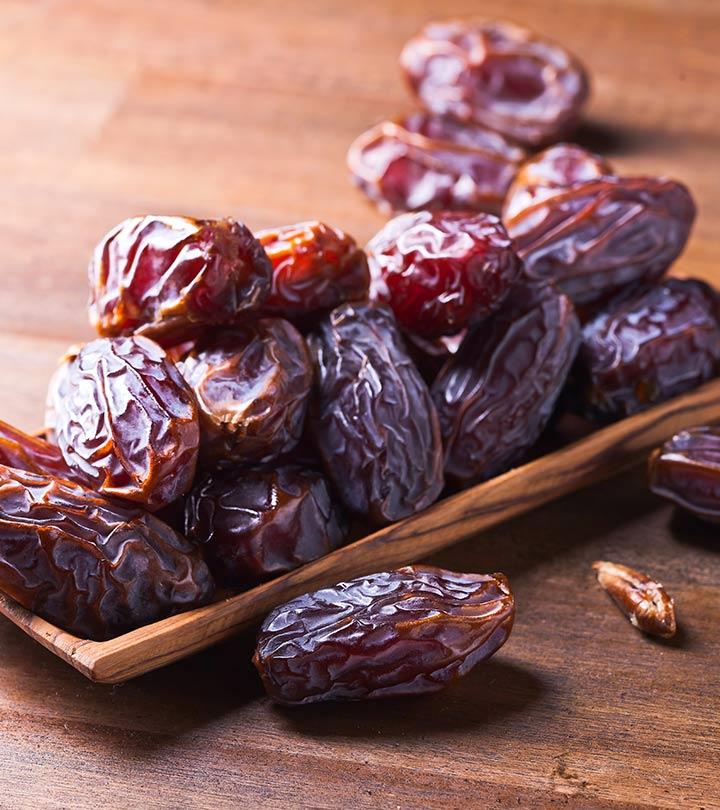
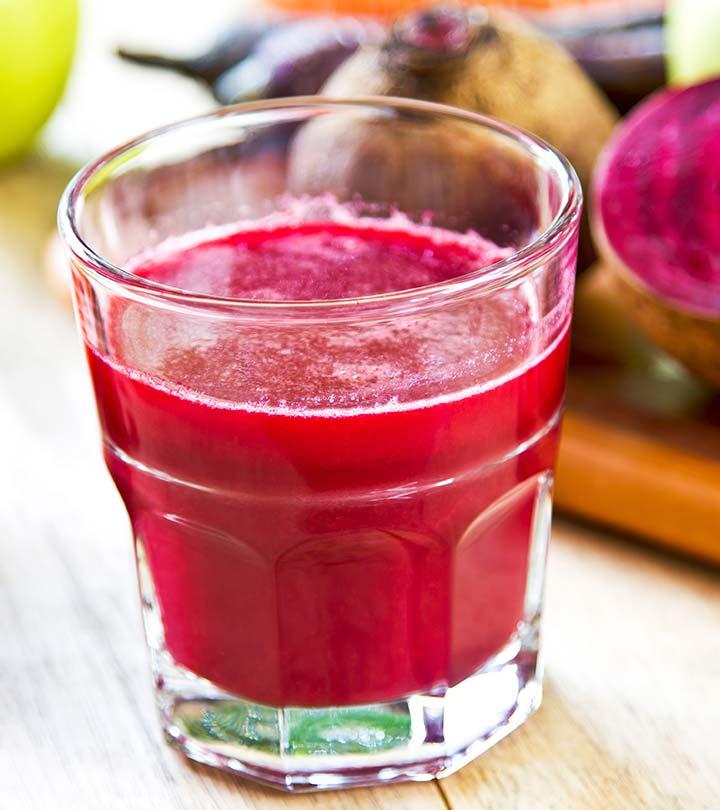
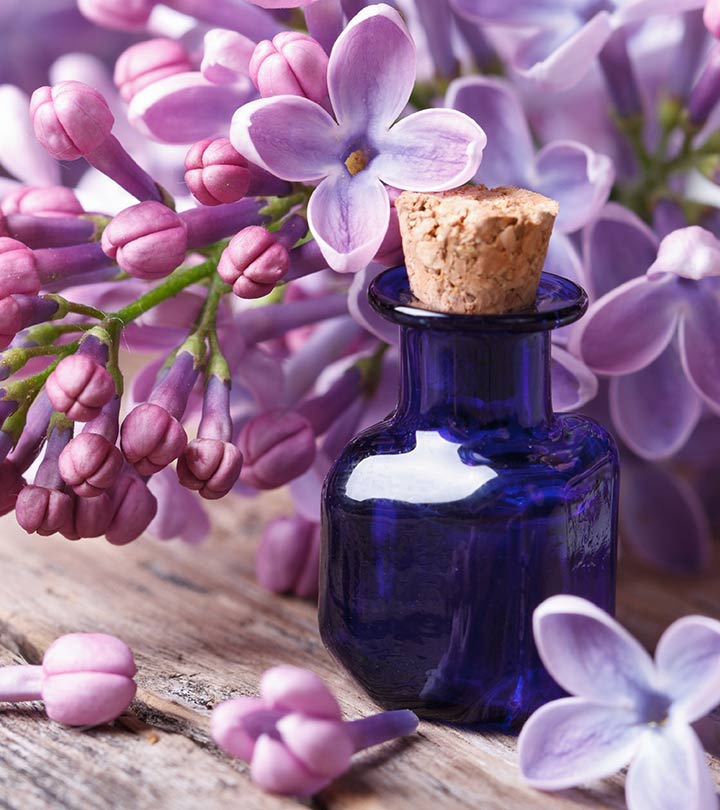

Community Experiences
Join the conversation and become a part of our empowering community! Share your stories, experiences, and insights to connect with other beauty, lifestyle, and health enthusiasts.